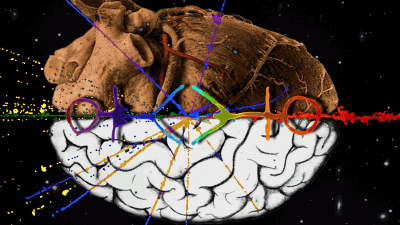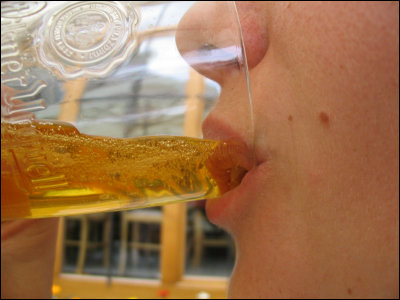How intestines affect human's mood

ByWill Keightley
It is said that there are about 10 trillion to 100 trillion of microorganisms in the human intestine, and the number is the number of human cells37 trillionIt is considered to be equal to or more than. ScientistsIntestinal floraAlthough we have been studying for many years to unravel what kind of microorganisms the intestinal bacterial flora (intestinal microbial flora) is made of, it is obvious from the research how the microorganisms affect human beings little by little It is becoming.
How Your Gut Affects Your Mood | FiveThirtyEight
http://fivethirtyeight.com/features/gut-week-gut-brain-axis-can-fixing-my-stomach-fix-me/

In recent years, as research on microorganisms in human intestines and intestines has progressed, it is becoming clear that microorganisms in the intestines play a very important role for brain and mental health. Mr. Ted Dinan, an expert on microbial research, seems to have been interested in "microorganisms (good microorganisms) that work well with the body" that was talked about among microbiologists in the early 2000s. The reason is that as a psychiatrist, I was interested in "What kind of influence the good microorganisms in the intestines have on human mental health?"
This "good microorganism" is known as a microorganism (good bacteria) which has a good influence on the human body "Probiotics"is.

ByAJC ajcann.wordpress.com
How long ago did the connection between the mental state of the intestine and the human being pointed out in the first place, what relationship had already been pointed out in the early 1800 's. William Beaumont, a military doctor who has become a pioneer of gastrointestinal physiology by studying gastric secretion, shows in his own note that human emotions change with gastrointestinal conditions. In the early 1900's, physicians and scientists said colon was a pathway for psychosis and microorganisms, and it was related to depression and neurological diseases. In this way, the relationship between intestinal and human mental status has been pointed out for a long time, but in the latest research, a complex two-way communication circuit for connecting digestive organs and the central nervous system, that is, the intestines and brain It is clear that it exists in the body.
When Dr. Jane Foster of McMaster University manipulated the intestinal microorganisms of the rats, it became clear how the stress situation and the response to stress influence the growth of the brain. In addition, intestinal flora affects genes related to myelin present in the prefrontal cortex (a material constituting the "pod" around the nerve), and it is a part related to mental disorders such as brain depression and schizophrenia It also has been found to affect even. Research results suggested that there is a potential mechanism by which microorganisms in the intestine can relate to the state of mental illness.
Research results showed that microorganisms in the intestine affect human's mental state, but why can microbes in the intestine influence the brain? This secret is made up of two elements, one in which intestinal microorganisms can secrete neurotransmitters such as acetylcholine, gamma aminobutyric acid (GABA), tryptophan. And the other is that there are millions of neurons in the intestines that can send signals to the brain in response to neurotransmitters. With these two, stimulation runs from the intestines to the brain, and antidepressant effect etc. are seen. Indeed, when Mr. Dinane gave the mouse a probiotic which is very close to that contained in yoghurt, the rat seems to have less feeling of mental condition such as "anxiety" or "depression" than at normal time. In addition, rats given probiotics seem to have secreted much GABA, a neurotransmitter deeply involved in depression and psychosis, which is the source of antidepressant effects such as probiotics It is considered.
In addition, the other published in October 2015InvestigationConcluded that "Although evidence is very limited, evidence has been found that probiotics are interfering with the psychological aspect of human beings."

ByHey Paul Studios
However, it seems that it is very difficult to know the mechanism of intestinal and microorganism more deeply. Professor Jonathan Eisan of the University of California, Davis "It is very important to understand the intestinal and brain systems to understand which microorganisms in the intestine are doing important work, It is very difficult to sample microbes in the intestine. " Of course there is something that is known, for example, there is no doubt that the change in meal content also causes changes in microorganisms in the intestine. Incidentally, Professor Ensan says, "The point of discussion is whether or not the intestinal flora can be effectively utilized for the human body."
Related Posts:
in Science, Posted by logu_ii







